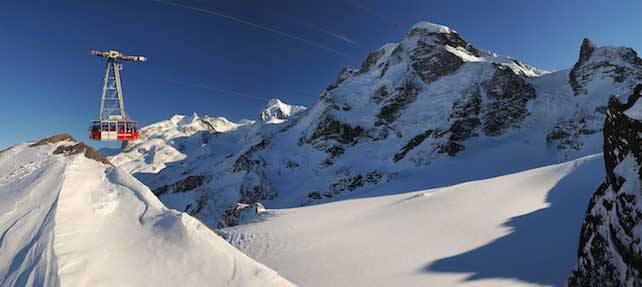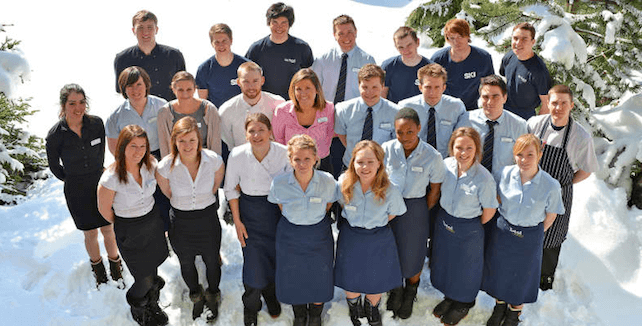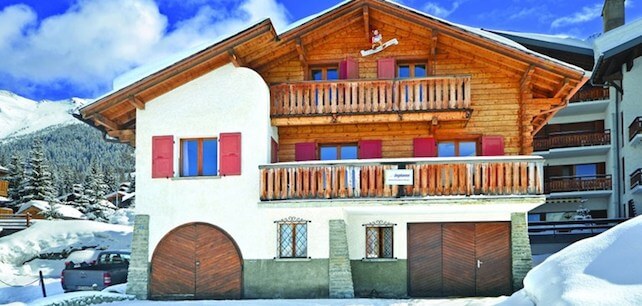
In what appears to be a short-sighted and ill-conceived piece of Swiss legislation, William Tell has managed to miss the golden apple of tourism altogether and shoot his son in both feet.
After 60 glorious years of ski fun and fondue, the shutters seem destined to finally slam down on the uniquely British concept of the relatively low cost Swiss chalet holiday. For next season we can expect the number of affordable catered chalets and chalet-hotels to diminish by as much as 40%. Over the following few years as current property contracts expire, such holiday properties seem doomed to disappear altogether. Indeed, were it not for those binding legal commitments, I’m sure that most operators would be running for the hills right now – or rather, well away from them.
“The sad fact is that the story of the Swiss chalet is all but over in the affordable mainstream,” says Andy Perrin, who is in charge of the ski programmes for Inghams, Ski Total, and Esprit Ski.
Indeed, the £800-plus half-board chalet holiday in Switzerland appears to be dead in the snow. However, the £2,000-plus week in the most expensive and luxurious chalets is likely to remain largely unaffected.
What’s it all about? Wages, of course…
The Swiss are insisting – and they’ve already sneaked it into law without any apparent consultation – that from this winter everyone in the hotel and catering industry should be paid a minimum of £33,800 a year.
Now, I guess that’s ok if you are a graduate of the hugely respected hotel school in Lausanne and have a job at the five-star W in Verbier or at the Mont Cervin in Zermatt. But the new law also encompasses the thousands of tour operator staff on UK contracts.

It includes the British chalet girl’s assistant, the kitchen porter, and the odd-job man. The change in the law came in too late last year for it to be enforced for this past winter and there was a stay of execution. However, the authorities are threatening to clamp down with deadly Swiss efficiency during the coming season.
For the graduate just down from uni it sounds just too good to be true, doesn’t it? Three hours of housework in the morning, then a full day hammering the slopes, a bit of veggie prep before dinner and finally the washing up before a night on the town complete with a fistful of Jaegermeister and Red Bull…all at £33,800! Nice work if you can get it.
Sounds a lot of cash? On May 18, 2014, the Swiss voted on whether or not to increase this figure by introducing a national minimum wage. In fact it was overwhelmingly rejected. This would have given the lowest paid worker in the country a gross minimum salary of £15 per hour that, with employment benefits, would gross up around £40,000 a year.
So what are we waiting for? Let’s all emigrate to Switzerland, guys
There’s also talk of introducing a universal wage whereby every single resident in the country gets a national salary just for being alive – regardless of whether or not he or she is in work. You don’t even have to get out of bed!
But before you fire off your chalet host application letters to Crystal, Inghams, Neilson and the like, take time out for an economic reality check.
All this largesse from the country that gave us chocolate and cuckoo clocks is sounding the death knell for the low end UK chalet. Why? Well, the whole concept is founded on the tour operator paying its staff seemingly lowly UK wages of £150-200 a week, albeit with a hefty support package of accommodation, meals, lift pass, insurance etc.
A group of disgruntled Swiss hoteliers started the revolt. They saw that UK-run chalets were full in Zermatt in January while their hostelries were largely empty and claimed that this was because of ‘slave labour.’ Piffle, of course.
“If that’s the case,” said Perrin, “how come we receive 8.5 applications for every job?”

Tour operators argue that because of the extraordinarily high cost of living in Switzerland the historical chalet worker package in fact gives staff more disposable income than if they were being paid Swiss wages.
“In effect they are ‘parachuted’ into an Alpine resort for the season. There’s no drain on the Swiss system,” says Perrin, “because they are not on the Swiss net. They are not living in Switzerland.”
‘Doing a season’ the Swiss way is daunting in the extreme. Firstly you have to get a job, work permit and Swiss health insurance. Then you have to find accommodation. Expect to pay at least £3,000 for a shared room for the season – and you’ll need to pay a third on signature and another third by the start of the season and also put up a hefty damage deposit. Then there’s utility bills, food, a season’s lift pass, insurance and travel to pay for, along with entertainment, ski clothing and equipment. If you get it right you’ll have a great season, and – if in the right job with tips – save a lot of money.
But the fact is that without the lower cost British chalet, resorts across Switzerland will suffer on a wide scale that includes the number of lift passes sold, ski rental, lessons, and restaurants both on and off the mountain. British tour operators have pointed out to Jean-Michel Cina, the economy minister for the Valais, that their clients boost the region’s income by a minimum 50 million CHF each winter. He is sympathetic, but powerless to intervene.

The British chalet story here began in a flat above an ironmonger’s shop on Grindelwald in 1958. Veteran tour operator Colin Murison-Small outlined the deal in an advert in The Daily Telegraph.
“An English girl, Loveday, who will be living in the chalet for the whole season, will feed you and will do all she can to make you comfortable and keep you happy. In addition to continental breakfast, lunch and dinner, you will be welcome to have tea with bread and butter and jam at no extra charge, although you will have to buy your own cakes.” You can bet all your Swiss francs that lovely Loveday wasn’t being paid as much as a junior hospital doctor or more than a police officer, or twice as much a waiter in Britain.
“It is,” says Perrin “commercial absurdity. Switzerland is a wonderful ski country with a long tradition of welcoming overseas guests. The chalet is a route by which lots of people have first been able to afford to experience the Alps in winter and become lifelong visitors to Switzerland.
“We would hate politicians and bureaucrats who don’t even live in ski resorts to bring an end to this with a cavalier disregard for mountain communities”.
Enjoy Peter’s rants? Check Why February Half Term May Be Hellish, Why You May No Longer Be Able to Get a Taxi at Geneva Airport, Is This the End of Ski Hosting in France? and and Are the Happy Days of Ski Hosting Over in France?














After 60 years of ski fun and fondue, the shutters seem destined to slam down on the lower cost Swiss chalet holiday https://t.co/KcUtdBHLbF
A change in the Swiss employment rules means there could be an end to the Swiss Chalet Holiday. https://t.co/bdhcZdEX6b
If low cost is the desire there are plenty of self-catering chalets instead (with a few more likely now) and this will boost the local restaurant trade to make up for the cold beds which the 2nd home ban was designed to offset.
Is the Swiss Chalet holiday over? not at SkiBoutique, purveyors of #luxury #swiss chalet holidays. https://t.co/51EgmZ3lA9
Well this could be interesting! MT @skieurope1: Is the Swiss Chalet Holiday Over? https://t.co/uNliXJHx0l
Should season workers be paid a minimum of £33800 a year? Interesting article by @welove2ski https://t.co/yGliOHfEeb
End of certain #Swiss #skiing holidays thanks to c£34K annual minimum salary https://t.co/6NvvkezqMK? UK min. = c£13K a year (via @skipedia)
I find this article rather puzzling. The referendum on May 18 { which is not expected to pass } is well known, but I have not read -and cannot find – any reference to a newly-enacted law that has set a high minimum wage for the hotel/catering sector.
Can Peter Hardy reference something about this legislation ?
Hi Derek, the law is an amendment or directive (Bundesratsbeschluss) which governs the applicability of the law in question – in this case effectively widening the net of the L-GAV employment laws to include a much broader category of hospitality providers, into which UK-run chalets and chalethotels now fall. It became law on June 12 ,2013.
Bad news if you ski in Switzerland! https://t.co/PNQnpiD2KD
Interesting, although I can see a way around this for companies. Many moons ago i worked for large Tour operator and we were paid the equivalent of French minimum wage although after deductions it worked out at £32.50 per week. Basically I was paid £1000 per month which was deposited into my bank account then the day after £860 was deducted from my bank to pay my rent for staff accommodation, lift pass contribution, uniform payment, meals, and payment for my travel out to resort and then back to UK (although in my contract of employment these things were included in my job) . This is how that company got around the issue of not paying minimum wage, but looking like it did.
Pretty interesting piece on the possible demise of ski chalets in Switzerland: https://t.co/xD20HNVFWj
Is the Swiss Chalet Holiday Over? | Welove2ski https://t.co/75UuYb3RhQ
Is the Swiss Chalet Holiday Over? | Welove2ski https://t.co/7HFwy9bCML via @welove2ski
Is the Swiss Chalet Holiday Over? | Welove2ski https://t.co/JwvHSFoTwc
Is the Swiss Chalet Holiday Over? https://t.co/azKhLYGls4
https://t.co/SwmUQrnIbG you might have to do some thinking @OllydeM
bad news for the affordable Swiss Ski Chalet https://t.co/zYVq47CN98
I worked as a Chalet host and I can tell you j worked a lot more than 3 hours a day. I was lucky if I saw the slopes. I can understand local people with families being worried about their wages. Salaries might be high for everyone one in Switzerland but it’s not cheap to live there. At least the Swiss companies have some morality.